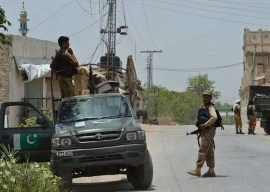Pro-furnace oil policies for power generation may cost the consumers heavily during the next decade if cheaper alternatives are not looked into. This prediction was made by a speaker at a seminar held here Wednesday, according to a press release.
Experts were unanimous in the view that high tariff rates were result of short-sightedness of policy-makers, corruption, mismanagement and unavailability of the right people at the right places.
The seminar titled “Rising Electricity Tariffs - from NEPRA’s Determination to Consumers’ Electricity Bill” was organised by the Institute of Policy Studies (IPS). Energy expert Salahuddin Rifai, National Electric Power Regulatory Authority (NEPRA) assistant director Salman Rehman, Islamabad Electric Supply Company (IESCO) Manager Customer Services Waheed Akram and IPS associate and coordinator of its Tawanai Program Ameena Sohail addressed the seminar.

Mirza Hamid Hasan, an IPS-National Academic Council member and a former water and power secretary, chaired the program.
Experts highlighted that the existing power tariff was Rs14 and with the addition of 17 per cent GST and 3.5 per cent excise duty it rises to Rs16.95, which is the highest in the region.
Criticising the short-sightedness of energy managers, the speakers and participants viewed the overwhelming share of fossil-fuel based power generation as the main cause of the exorbitant per kilowatt-hour (KWH) tariff.
It was revealed that in India and Bangladesh, the tariff for the same unit was Rs7.36 and Rs5.47 respectively, while in the US, it was equal to Rs8.59.
Presenting an overview of the country’s energy planning since the beginning, Rifai informed that Water and Power Development Authority (WAPDA) started at 118 megawatt (MW) installed capacity, 700 GWH generation, Rs70 million in annual revenue and 270,000 consumers.
The power sector of the country was initially self-financing, and by the mid-1980s, the power generation capacity of WAPDA rose to about 5,700MW.
In 1985, the concept of private power generation was introduced.
He lamented that in 1988, by signing the first MOU for the furnace-oil based Hubco plant, Pakistan became the first country in the Third World to have private power generation.
Presenting data on achievements against planned targets in installed capacity of power generation from 1955 to 2010, Rifai told that the progress from the first five-year plan (1955-60) to the eighth one (1993-98) was quite satisfactory.
Unfortunately, however, no addition was planned in the ninth five-year plan (1998-2003) and only a deplorable six per cent target was achieved against the planned 7,880MW in the Medium Term Development Framework (2005-2010). He said due to this failure, today, the electricity shortfall has reached 3,916MW.
NEPRA’s Salman Rehman apprised the participants about the tariff determination mechanism of the authority. He said that despite regular public hearings to determine rates there was very little input from consumers’ organisations and representatives.
IESCO’s representative Waheed Akram said that the distribution company was collecting ‘more’ than 100 per cent bills from private, commercial and industrial customers and that around 25 per cent of an average bill also consists of various taxes that the government was collecting through the district supply companies.
However, he informed, the recoveries from the government sector were only 53 per cent. Interestingly, the AJK government pays only Rs2.2 per unit to IESCO against the NEPRA’s determined tariff of Rs12 for government departments, he disclosed.
Published in The Express Tribune, January 31st, 2014.
COMMENTS (3)
Comments are moderated and generally will be posted if they are on-topic and not abusive.
For more information, please see our Comments FAQ

1731329418-0/BeFunky-collage-(39)1731329418-0-165x106.webp)



1731771315-0/images-(3)1731771315-0-270x192.webp)











Isn't this the same Pakistan that wanted to eat grass? Looks like that dream is coming true shortly.